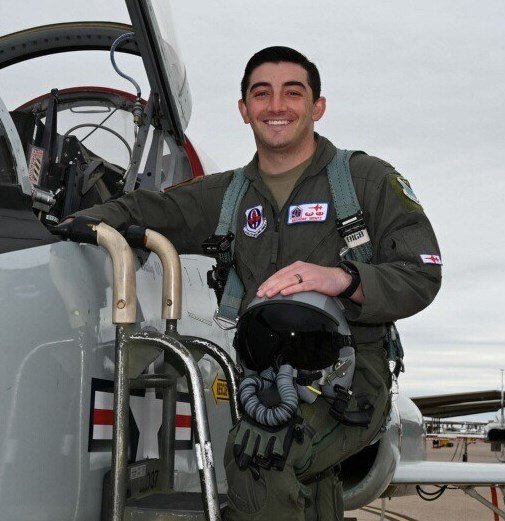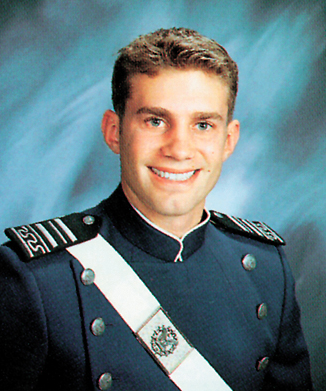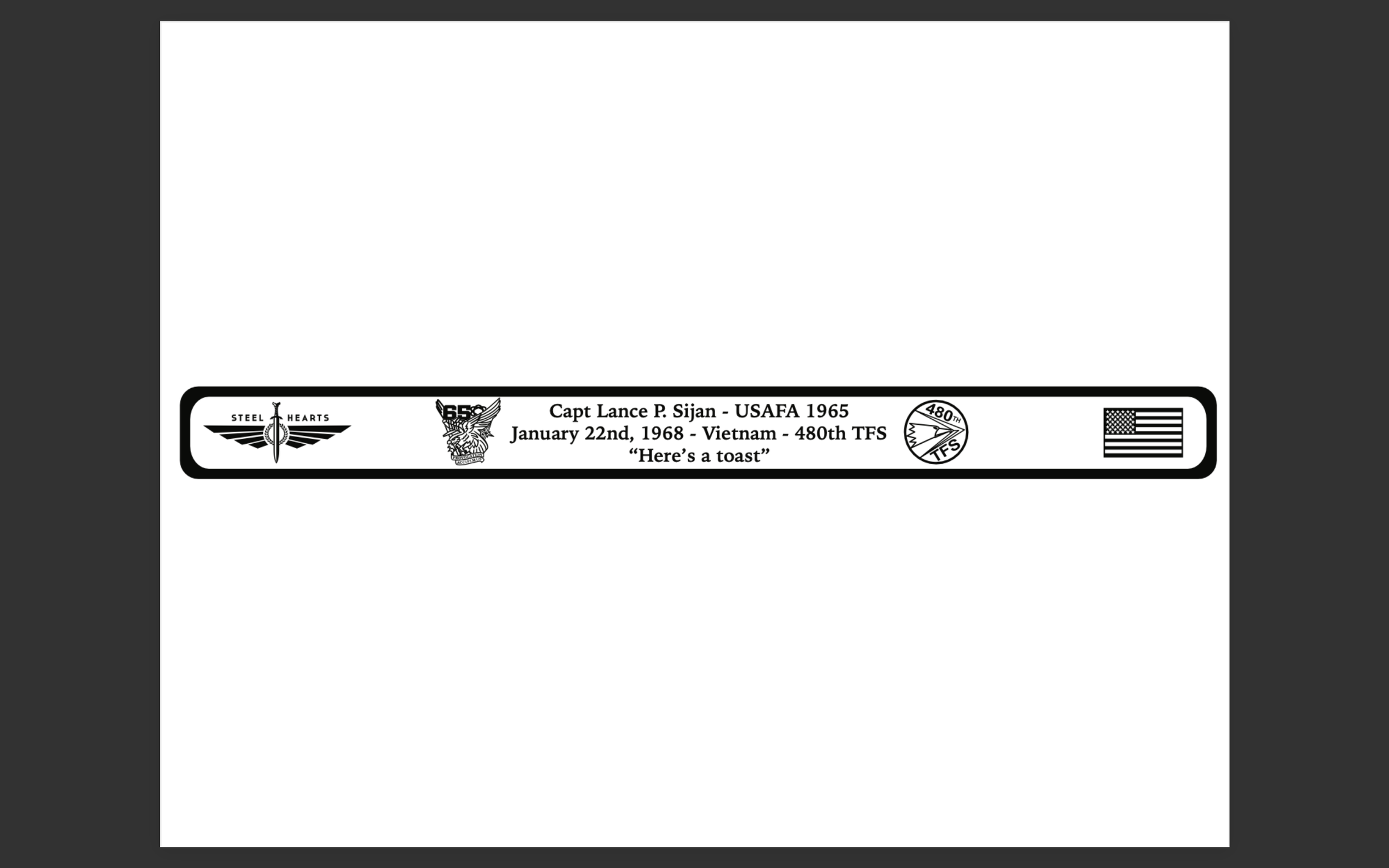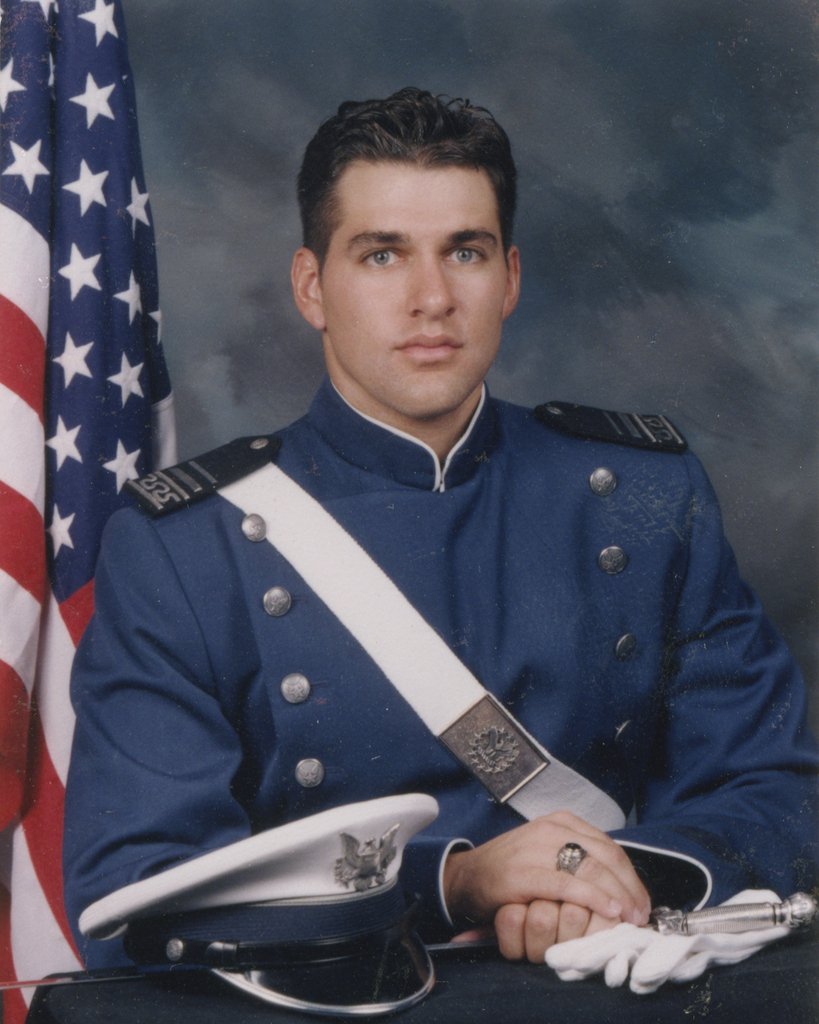 Image 1 of 2
Image 1 of 2

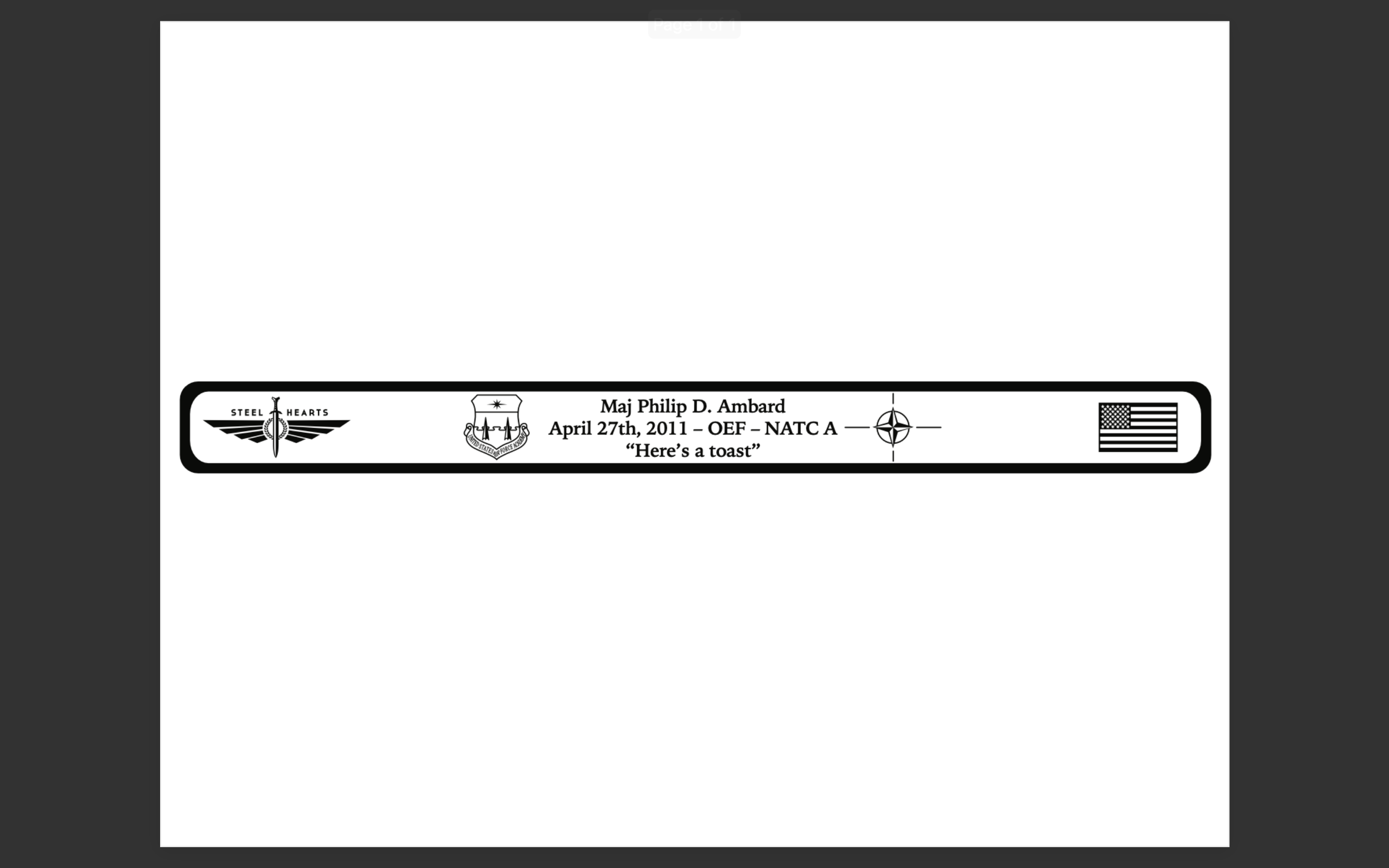 Image 2 of 2
Image 2 of 2



Maj Philip D. Ambard (USAF)
Philip Dave Ambard was born April 4, 1967 at Caracas, Capital District in Venezuela. He came to this country in 1979 at the young age of 12. Until he entered the U.S. Air Force in 1985, he lived with his mother.
When he arrived in the United States, Philip Ambard spoke no English. Television shows (soap operas in particular) became his English teachers and he learned to speak the language of his adopted country without an accent. His favorite TV learning tools were All My Children and General Hospital. School was difficult for him — and without a doubt, he faced many challenges throughout his lifetime. However, with hard work and determination he conquered them all.
In February of 1985, while Philip Ambard was a senior in high school and still underage, his mother, on her son’s behalf, filed his Petition for Naturalization. This was the first step for Philip Ambard to become a citizen of the United States.
Having been told that it would speed up the process to receive his citizenship papers if he was in the military, at the age of 18, he joined the U.S. Air Force. It was to become his career for the remainder of his life.
Enlisting in the Air Force, Philip Ambard was an Airman First Class, then attained the rank of Sergeant and in 2000, he became an officer. During his 26 years in the military, he served at several stations — including Holloman Air Force Base in New Mexico, Mountain Home Air Force Base in Idaho, Hill Air Force Base in Utah and at the American Air Base in Bitburg, Germany. He married in 1988. With his marriage, he became the step-father to three young children; later he and his wife would have two more children.
In 2002, he was assigned to the 460th Space Communication Squadron, Buckley Air Force Base in Aurora, Colorado. In December of 2003, he began teaching at the U.S. Air Force Academy Department of Foreign Languages, Colorado Springs, and soon became one of the academy’s most respected officers, as well as a dedicated and hard-working member of the teaching staff.
While serving in the Air Force, he attended night school and received his bachelor’s degree. He didn’t stop there. Continuing his education, he earned his master’s from the University of Colorado at Colorado Springs, and a doctorate from the University of Denver.
Forty-four-year-old Maj. Philip Ambard, a 26-year veteran of the Air Force, had never flown a plane — had never been in battle. As an assistant professor at the academy, he taught Spanish and French to young cadets. Maj. Ambard actually spoke eight languages. Admired and respected, he held a special place in the hearts of his students.
In the early months of 2011, during the conflict known as Operation Enduring Freedom, Maj. Ambard was on a tour of duty with the NATO Air Training Command in Afghanistan. He had never been on an assignment in a danger zone before and thought it would be a benefit in his work to learn firsthand about some of the trials his cadet students would face in the future. He had volunteered during this conflict to become a NATO advisor in the training of men for the fledgling Afghan Air Force. Maj. Ambard had been stationed in Afghanistan, far from his Colorado home and his family for four months.
The Kabul Airport was controlled by the military and was considered one of the better-protected places in Afghanistan. On the morning of April 27, 2011, two dozen people, including Maj. Ambard, had gathered for a meeting in a conference room at the airport, when suddenly and without warning a 46-year-old Afghan man, a helicopter pilot in the Afghan Air Force, pulled a pistol from his flight suit and rapidly opened fire, killing Maj. Ambard and seven other members of the U.S. Air Force, as well as one civilian contractor — all were Americans. The shooter, a man Maj. Ambard had liked and considered to be a friend, then died himself, either by his own hand or during the subsequent gunfire. After an eight-month investigation by the U.S. Air Force, it was concluded that the shooter acted alone; however, the reason for the attack was never fully understood.
After the tragedy, Maj. Ambard’s body was flown home; first to Dover Air Force Base in Dover, Delaware, where his widow was waiting, and then to Colorado. After an impressive military service at the Cadet Chapel, Maj. Ambard was buried at the United States Air Force Academy Cemetery, Colorado Springs, Colorado. He was survived by his wife and their five children.
Philip Ambard never forgot the opportunities he had been given in his adopted country and he was forever grateful. It was a principle he had always believed and taught to others — especially to all five of his children, who remembered and have followed the gigantic footsteps their father left behind.
At the Air Force Academy in Colorado, this respected and hard-working professor has never been forgotten. In his honor, a year ago, the academy established the Maj. Philip Ambard Conference Room. Here’s a toast.
— By Betty Lou Gaeng
Philip Dave Ambard was born April 4, 1967 at Caracas, Capital District in Venezuela. He came to this country in 1979 at the young age of 12. Until he entered the U.S. Air Force in 1985, he lived with his mother.
When he arrived in the United States, Philip Ambard spoke no English. Television shows (soap operas in particular) became his English teachers and he learned to speak the language of his adopted country without an accent. His favorite TV learning tools were All My Children and General Hospital. School was difficult for him — and without a doubt, he faced many challenges throughout his lifetime. However, with hard work and determination he conquered them all.
In February of 1985, while Philip Ambard was a senior in high school and still underage, his mother, on her son’s behalf, filed his Petition for Naturalization. This was the first step for Philip Ambard to become a citizen of the United States.
Having been told that it would speed up the process to receive his citizenship papers if he was in the military, at the age of 18, he joined the U.S. Air Force. It was to become his career for the remainder of his life.
Enlisting in the Air Force, Philip Ambard was an Airman First Class, then attained the rank of Sergeant and in 2000, he became an officer. During his 26 years in the military, he served at several stations — including Holloman Air Force Base in New Mexico, Mountain Home Air Force Base in Idaho, Hill Air Force Base in Utah and at the American Air Base in Bitburg, Germany. He married in 1988. With his marriage, he became the step-father to three young children; later he and his wife would have two more children.
In 2002, he was assigned to the 460th Space Communication Squadron, Buckley Air Force Base in Aurora, Colorado. In December of 2003, he began teaching at the U.S. Air Force Academy Department of Foreign Languages, Colorado Springs, and soon became one of the academy’s most respected officers, as well as a dedicated and hard-working member of the teaching staff.
While serving in the Air Force, he attended night school and received his bachelor’s degree. He didn’t stop there. Continuing his education, he earned his master’s from the University of Colorado at Colorado Springs, and a doctorate from the University of Denver.
Forty-four-year-old Maj. Philip Ambard, a 26-year veteran of the Air Force, had never flown a plane — had never been in battle. As an assistant professor at the academy, he taught Spanish and French to young cadets. Maj. Ambard actually spoke eight languages. Admired and respected, he held a special place in the hearts of his students.
In the early months of 2011, during the conflict known as Operation Enduring Freedom, Maj. Ambard was on a tour of duty with the NATO Air Training Command in Afghanistan. He had never been on an assignment in a danger zone before and thought it would be a benefit in his work to learn firsthand about some of the trials his cadet students would face in the future. He had volunteered during this conflict to become a NATO advisor in the training of men for the fledgling Afghan Air Force. Maj. Ambard had been stationed in Afghanistan, far from his Colorado home and his family for four months.
The Kabul Airport was controlled by the military and was considered one of the better-protected places in Afghanistan. On the morning of April 27, 2011, two dozen people, including Maj. Ambard, had gathered for a meeting in a conference room at the airport, when suddenly and without warning a 46-year-old Afghan man, a helicopter pilot in the Afghan Air Force, pulled a pistol from his flight suit and rapidly opened fire, killing Maj. Ambard and seven other members of the U.S. Air Force, as well as one civilian contractor — all were Americans. The shooter, a man Maj. Ambard had liked and considered to be a friend, then died himself, either by his own hand or during the subsequent gunfire. After an eight-month investigation by the U.S. Air Force, it was concluded that the shooter acted alone; however, the reason for the attack was never fully understood.
After the tragedy, Maj. Ambard’s body was flown home; first to Dover Air Force Base in Dover, Delaware, where his widow was waiting, and then to Colorado. After an impressive military service at the Cadet Chapel, Maj. Ambard was buried at the United States Air Force Academy Cemetery, Colorado Springs, Colorado. He was survived by his wife and their five children.
Philip Ambard never forgot the opportunities he had been given in his adopted country and he was forever grateful. It was a principle he had always believed and taught to others — especially to all five of his children, who remembered and have followed the gigantic footsteps their father left behind.
At the Air Force Academy in Colorado, this respected and hard-working professor has never been forgotten. In his honor, a year ago, the academy established the Maj. Philip Ambard Conference Room. Here’s a toast.
— By Betty Lou Gaeng
Philip Dave Ambard was born April 4, 1967 at Caracas, Capital District in Venezuela. He came to this country in 1979 at the young age of 12. Until he entered the U.S. Air Force in 1985, he lived with his mother.
When he arrived in the United States, Philip Ambard spoke no English. Television shows (soap operas in particular) became his English teachers and he learned to speak the language of his adopted country without an accent. His favorite TV learning tools were All My Children and General Hospital. School was difficult for him — and without a doubt, he faced many challenges throughout his lifetime. However, with hard work and determination he conquered them all.
In February of 1985, while Philip Ambard was a senior in high school and still underage, his mother, on her son’s behalf, filed his Petition for Naturalization. This was the first step for Philip Ambard to become a citizen of the United States.
Having been told that it would speed up the process to receive his citizenship papers if he was in the military, at the age of 18, he joined the U.S. Air Force. It was to become his career for the remainder of his life.
Enlisting in the Air Force, Philip Ambard was an Airman First Class, then attained the rank of Sergeant and in 2000, he became an officer. During his 26 years in the military, he served at several stations — including Holloman Air Force Base in New Mexico, Mountain Home Air Force Base in Idaho, Hill Air Force Base in Utah and at the American Air Base in Bitburg, Germany. He married in 1988. With his marriage, he became the step-father to three young children; later he and his wife would have two more children.
In 2002, he was assigned to the 460th Space Communication Squadron, Buckley Air Force Base in Aurora, Colorado. In December of 2003, he began teaching at the U.S. Air Force Academy Department of Foreign Languages, Colorado Springs, and soon became one of the academy’s most respected officers, as well as a dedicated and hard-working member of the teaching staff.
While serving in the Air Force, he attended night school and received his bachelor’s degree. He didn’t stop there. Continuing his education, he earned his master’s from the University of Colorado at Colorado Springs, and a doctorate from the University of Denver.
Forty-four-year-old Maj. Philip Ambard, a 26-year veteran of the Air Force, had never flown a plane — had never been in battle. As an assistant professor at the academy, he taught Spanish and French to young cadets. Maj. Ambard actually spoke eight languages. Admired and respected, he held a special place in the hearts of his students.
In the early months of 2011, during the conflict known as Operation Enduring Freedom, Maj. Ambard was on a tour of duty with the NATO Air Training Command in Afghanistan. He had never been on an assignment in a danger zone before and thought it would be a benefit in his work to learn firsthand about some of the trials his cadet students would face in the future. He had volunteered during this conflict to become a NATO advisor in the training of men for the fledgling Afghan Air Force. Maj. Ambard had been stationed in Afghanistan, far from his Colorado home and his family for four months.
The Kabul Airport was controlled by the military and was considered one of the better-protected places in Afghanistan. On the morning of April 27, 2011, two dozen people, including Maj. Ambard, had gathered for a meeting in a conference room at the airport, when suddenly and without warning a 46-year-old Afghan man, a helicopter pilot in the Afghan Air Force, pulled a pistol from his flight suit and rapidly opened fire, killing Maj. Ambard and seven other members of the U.S. Air Force, as well as one civilian contractor — all were Americans. The shooter, a man Maj. Ambard had liked and considered to be a friend, then died himself, either by his own hand or during the subsequent gunfire. After an eight-month investigation by the U.S. Air Force, it was concluded that the shooter acted alone; however, the reason for the attack was never fully understood.
After the tragedy, Maj. Ambard’s body was flown home; first to Dover Air Force Base in Dover, Delaware, where his widow was waiting, and then to Colorado. After an impressive military service at the Cadet Chapel, Maj. Ambard was buried at the United States Air Force Academy Cemetery, Colorado Springs, Colorado. He was survived by his wife and their five children.
Philip Ambard never forgot the opportunities he had been given in his adopted country and he was forever grateful. It was a principle he had always believed and taught to others — especially to all five of his children, who remembered and have followed the gigantic footsteps their father left behind.
At the Air Force Academy in Colorado, this respected and hard-working professor has never been forgotten. In his honor, a year ago, the academy established the Maj. Philip Ambard Conference Room. Here’s a toast.
— By Betty Lou Gaeng

